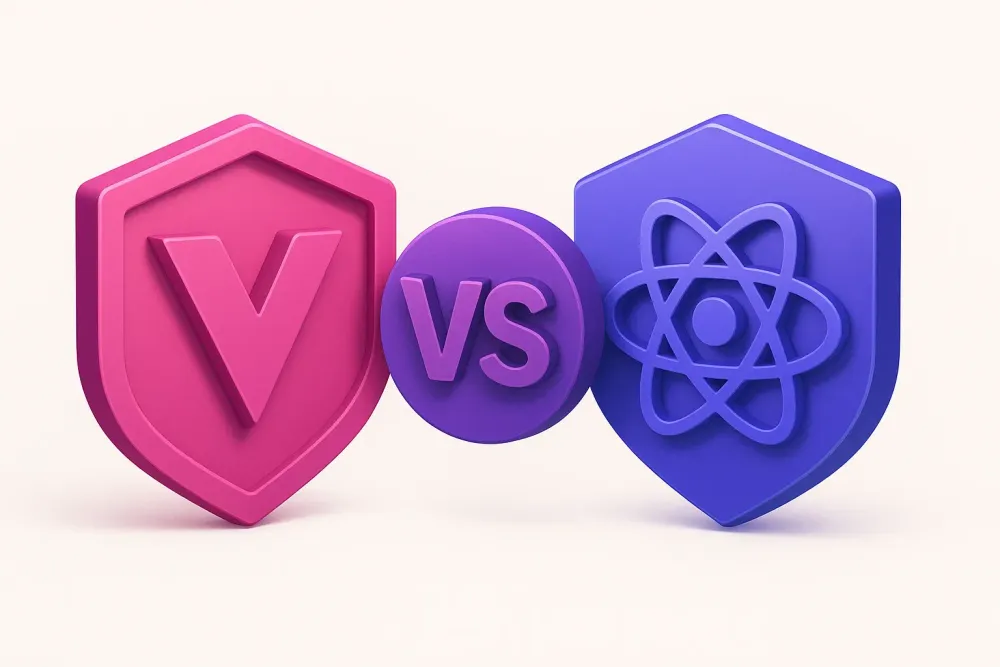Home
Services
Products
Projects
Who We Are
Blogs
Contact Us

Vue.js vs. React.js: Choosing the Right JavaScript Framework for Your Project
When it comes to front-end web and mobile app development, two things remain true:
- JavaScript rules the landscape.
- React.js dominates as a top-tier library.
React’s prominence is further amplified through React Native, Facebook’s popular cross-platform development framework. However, another player—Vue.js—is rapidly gaining ground. As adoption rises, so does the debate: Vue.js vs React.js – which one should you choose?
In this article, we dive into a comprehensive comparison of these two powerful JavaScript frameworks to help you decide which is right for your next project.
What Is React.js?
Created by Facebook, React.js is a JavaScript library used to build dynamic and scalable user interfaces. It serves as the “view” in an MVC (Model-View-Controller) architecture and supports server-side rendering with Node.js, making it a versatile tool for both web and native mobile apps.
Key Features of React.js:
- JSX syntax for UI design
- Component-based architecture
- Unidirectional data flow using tools like Flux
- Strong integration with React Native for mobile apps
What Is Vue.js?
Vue.js is a lightweight, open-source JavaScript framework developed by Evan You, a former Google engineer. It’s designed for creating interactive UIs and single-page applications (SPAs).
Key Features of Vue.js:
- HTML-based templating system
- Virtual DOM for optimal rendering
- Reactive data binding via watchers
- Rich animation support with built-in plugins
Pros & Cons: React.js vs Vue.js
Pros of React.js
- Easy to Learn: Especially for developers familiar with HTML.
- High Flexibility: Enables dynamic, responsive UIs.
- Virtual DOM: Efficient UI updates and rendering.
- Strong Community: Open-source, constantly evolving.
- Seamless Versioning: Easy migration across versions.
Cons of React.js
- Incomplete Documentation: Can create confusion for beginners.
- Advanced Concepts Require Learning: Tools like Redux can steepen the curve.
Pros of Vue.js
- HTML-Centric: Easy for developers with HTML knowledge.
- Lightweight: Just 18–21KB, making it ideal for any size project.
- Excellent Documentation: Very developer-friendly.
- Easy Integration: Works well in existing projects.
- Component Reusability: Boosts development efficiency.
Cons of Vue.js
- Smaller Community: Fewer third-party libraries and support.
- Over-Flexibility: Can complicate large-scale projects.
- Documentation Gaps in Language: Some resources lack full English translations.
Direct Comparison: Vue.js vs React.js
Key Factors to Consider:
- DOM Interaction: React uses a Virtual DOM; Vue’s granular rendering is great for animations.
- Performance: Both are fast, but Vue’s smaller size gives it an edge in certain use cases.
- Developer Experience: Vue's structure promotes readability. React requires more setup but offers flexibility.
- Scalability: React is more scalable for large enterprise apps due to its modular structure.
- Syntax Flexibility: Vue supports both templates and JSX. React is JSX-centric.
- State Management: Vue uses Vuex, React uses Redux. Vuex is simpler for small apps; Redux offers more control for complex states.
- Mobile App Development: React Native is more mature than Vue’s NativeScript integration.
- Community & Ecosystem: React has a larger ecosystem and more enterprise-level support.
- Integration: Vue integrates more seamlessly into legacy systems and smaller projects.
- Corporate Adoption: Both are trusted by major companies—React (Facebook, Instagram, Netflix), Vue (Alibaba, Xiaomi, GitLab).
When Should You Use Each Framework?
Use React.js When:
- You're building complex, large-scale applications.
- You need to support mobile platforms using React Native.
- You want access to a large community and extensive tooling.
Use Vue.js When:
- You want to build simpler, fast-launching applications.
- You prefer clean HTML templates over JSX.
- You’re working with tight deadlines or integrating into existing codebases.
Conclusion
React.js and Vue.js are both excellent front-end frameworks, each offering distinct strengths. While React dominates in large-scale and cross-platform development, Vue excels with its simplicity and fast integration—ideal for smaller teams or rapid MVPs.
The right choice depends on your project’s goals, development timeline, and scalability requirements.
If you're unsure which technology fits best for your business, the experts at DEFX can help you evaluate and implement the right front-end framework for long-term success.
See More
Contact Us
Let’s make your Idea into Reality
Let's Talk
© Copyright DEFX. All Rights Reserved
GoodFirms ★ 4.2
Clutch ★ 4.2
Google ★ 4.2
